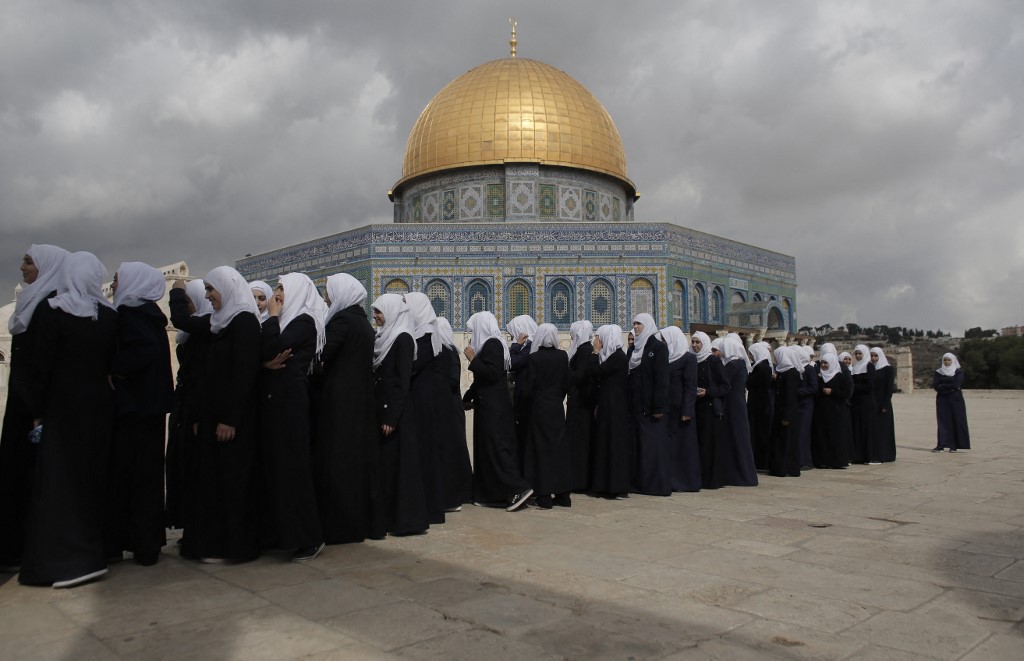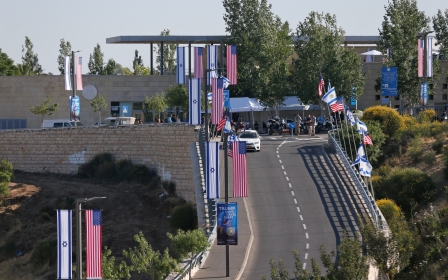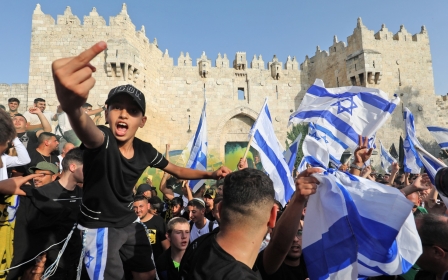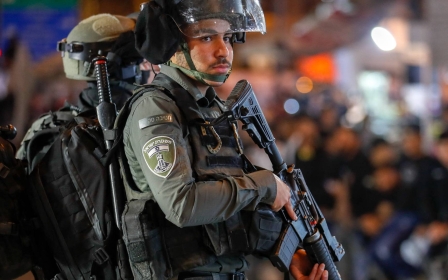Israel revokes permanent licences at six Palestinian schools in Jerusalem
Israeli authorities on Thursday rescinded the permanent licenses previously granted to six Palestinian schools in occupied east Jerusalem, claiming that their textbooks "incite against the State of Israel and the Israeli army".
The decision, announced by Israeli Minister of Education Shasha Biton said the targeted schools would be granted temporary licences that would enable them to continue operating for a year, provided that work is done to amend the curricula.
'The danger of the Israeli or ''distorted Palestinian'' curriculum lies in its falsification of history'
- Dima al-Samman, Palestinian ministry of education
Commenting on the unprecedented measures, the director of the Jerusalem affairs unit at the Palestinian ministry of education, Dima al-Samman, said that it was part of a drive to compel Palestinian students in Jerusalem to move to schools that teach the Israeli curriculum, many of which have been built by the Israeli government in recent years.
She said she was not surprised by the move, because attempts to isolate education in Jerusalem have been "in full swing" since the Israeli occupation of the city in 1967.
"The danger of the Israeli or 'distorted Palestinian' curriculum lies in its falsification of history," she told Middle East Eye. "It attempts to eliminate the national awareness of the children of Jerusalem and create a sense of inferiority within them."
New MEE newsletter: Jerusalem Dispatch
Sign up to get the latest insights and analysis on Israel-Palestine, alongside Turkey Unpacked and other MEE newsletters
The affected schools are the secondary section of Ibrahimieh College in Al-Sawwana neighbourhood in Jerusalem, with 288 male and female students, and five branches of the primary stage of Al-Eman Schools, which has a total of 1,755 boys and girls.
The education ministry claimed that it seized books from the above schools containing content "glorifying the prisoners and their armed struggle against the State of Israel," accusations of Israel's responsibility for the water crisis in areas run by the Palestinian Authority, and "harsh allegations about killing, deportation and military massacres".
Samman pointed out that 35 percent of Jerusalemite students receive their education in private schools in Jerusalem, which have been recently targeted with this step.
Only the beginning
In order to prevent the "forced migration" from Palestinian to Israeli education, Samman pointed out that her ministry works side by side with the parents' union of Jerusalem students to educate the community about the downsides of enrolling their children in schools that apply the Israeli curriculum, and its consequences for their national identity, future and historical awareness.
The head of the union, Ziad al-Shamali, told MEE that 42 percent of Jerusalem schools will be subject to the arbitrary measure as a condition imposed due to the funding these schools receive from the Israeli education ministry and the municipality.
Among the conditions is the application of the censored version of the Palestinian curriculum, which edits out certain content before its distribution to students.
The censored content, Shamali said, includes the logo of the Palestinian Authority, the Palestinian flag, lessons that discuss the Palestinian struggle against occupation, adherence to the land, the right of return and prisoners, settlements, the immigration of settlers to Palestine, military checkpoints, the intifada, displaced villages, and considering Zionism a racist political movement.
Shamali said that restricting the licences of the six schools is only a prelude to applying the same measures to the rest of Palestinian schools in Jerusalem.
About a month ago, the education ministry summoned the principals of the six schools and listened to their statements regarding the curriculum, according to one of the principals of these schools, who spoke to MEE on condition of anonymity.
The principal said the schools had not been officially notified of the ministry's decision and that they heard about it from the media.
The six schools are all private. There are four other school categories in Jerusalem: schools run by endowments, the municipality, UNRWA (the UN relief agency), and private contractors.
Private schools are administratively affiliated with churches, charities and individuals, and teach the original Palestinian curriculum.
Endowments Schools, 52, are administratively affiliated to the Palestinian Authority and operate under the umbrella of the Jordanian Endowments. They also teach the authentic Palestinian curriculum.
There are six UNRWA schools in Jerusalem and are affiliated with the United Nations Relief and Works Agency for Refugees. They have about 1,800 students and also teach the authentic Palestinian curriculum.
Municipal schools are those run by the Israeli government. Their curriculum is either an amended version of the Palestinian one or an Israeli curriculum.
The fifth category is called "Contractors' schools". They are run by individuals on behalf of the Israeli education ministry.
There are about 98,428 Jerusalemite students in the primary, preparatory and secondary stages, according to statistics published in July by the Faisal Husseini Foundation.
About 45,500 of them go to 146 schools affiliated with the Palestinian education umbrella (endowments, private schools, UNRWA schools), while the rest go to schools affiliated to the administration of the Israeli Ministry of Education.
The ministry seeks to control the education system in Jerusalem, and one of the mechanisms to achieve this goal is to increase the number of classrooms in existing schools and build new schools to attract more students.
In this context, the Israeli government opened 32 new schools between 2014 and 2020 in East Jerusalem, according to data from the municipality.
Five-year plan
The attack on education intensified with the announcement of the implementation of a five-year plan in the city of Jerusalem, which extends from October 2018 to October 2023.
This plan, titled "The Five-Year Plan: Reducing Social and Economic Gaps and Economic Development in East Jerusalem, 2018-2023", has an estimated budget of $657m.
It covers six sectors: education and higher education, economy and trade, employment and welfare, transportation, improving the quality of life and services provided to the population, and planning and registering land.
The largest share of the plan's budget has been allocated to education, at 445 million shekels ($127m).
Of this amount, about $59m is allocated to encourage participation in Israeli education by increasing the number of students studying the Israeli curriculum in East Jerusalem.
Article 50 of the Fourth Geneva Convention and Article 26 of the Universal Declaration of Human Rights guarantee the right of peoples under occupation to obtain education in line with their beliefs and to protect their culture and heritage from change or distortion.
Middle East Eye delivers independent and unrivalled coverage and analysis of the Middle East, North Africa and beyond. To learn more about republishing this content and the associated fees, please fill out this form. More about MEE can be found here.





